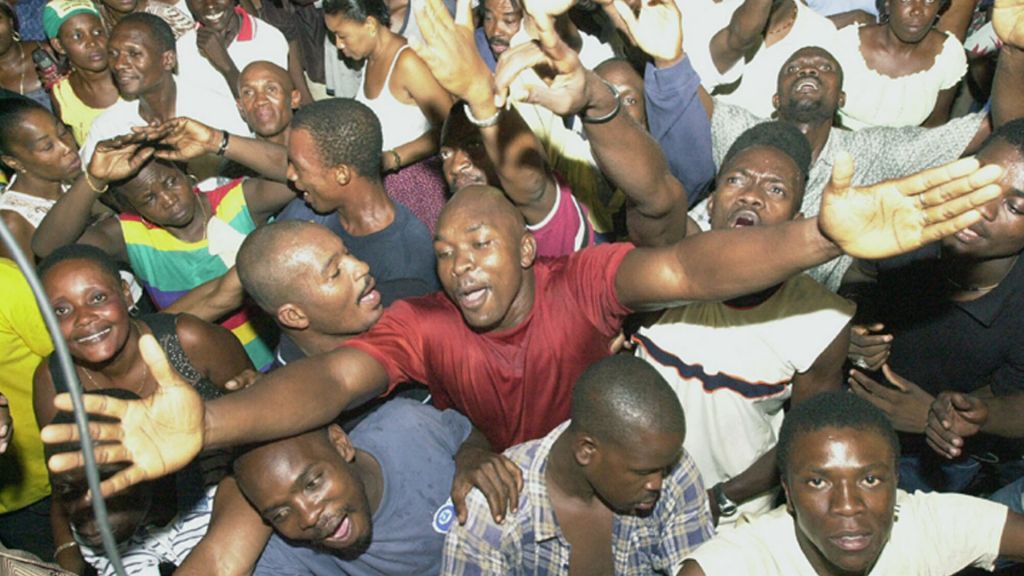
Director Whitney Dow (Two Towns of Jasper) set out to make a film about Haiti that was not all about poverty, tragedy, or corruption, which is generally how Haiti is portrayed from the outside. In making When the Drum is Beating — about Septentrional, a band that has persevered and flourished in Haiti for 65 years — he brings a story of a nation with a unflagging spirit and passion for its unique and rich cultural identity. When the Drum is Beating premieres on Independent Lens on April 12, 2012 at 10 PM (check local listings).
What impact do you hope this film will have?
I really hope that this film helps change the way that people think about Haiti. Much of the time, the media focuses on the negative aspects of the country, I wanted to make something positive.
What led you to make When the Drum is Beating?
I was introduced to the band by the producers of this film, Jane Regan and Daniel Morel, and I thought that their story of enduring in Haiti for 65 years was incredibly inspirational.
What were some of the challenges you faced in making this film?
While most of the challenges you face making any independent film revolve around money, the logistical challenges of this film were pretty extraordinary. We had to light and shoot music concerts with 25,000 attendees with a trilingual crew in places where there was no real infrastructure or electricity, let alone production support.
How did you gain the trust of the band and the Haitian people you encountered?
Making a film about Septentrional in Haiti is like making a film about the Red Sox in Boston. There was such a sense of relief that we were making a film about something that Haitians were proud of that we were immediately embraced by the both the band and the community.
What would you have liked to include in your film that didn’t make the cut?
I would have liked to put more into the film about the history and structure of Vodou Jazz. Every beat has a very specific relationship to a Vodou god or concept. The music that Septentrional plays is incredibly deep.
Tell us about a scene in the film that especially moved or resonated with you.
I felt a real sympathetic connection to Michel Tassy, a singer in the band for 45 years, when he talked about his fears that the younger guys in the band are trying to push him out. All of us, whatever we do, feel the hot breath of our younger, more driven and talented replacement on our necks.
https://youtube.com/watch?v=O9__pk38-5A
What has the audience response been so far? Has the band seen it, and if so, what did they think?
The film has been incredibly well received. It has played at about 25 festivals in countries all over the world and the reaction has been wonderfully positive. I was concerned as the film has a unique narrative structure that mixes history with music, and it is gratifying to see people respond to it. The band has seen the film, and although I think some of them were initially surprised that it does not focus just on the band, they really love it and have been incredibly supportive.
The independent film business is tough. What keeps you motivated?
I have no idea. My commitment to independent filmmaking defies all rational explanation.
Why did you choose to present your film on public television?
PBS is the only place in the United States that is shows films like this. In a world that is increasingly caught up in the trivial and prurient, PBS’s unrelenting commitment to producing content about important ideas is incredibly inspiring.
What didn’t you get done when you were making When the Drum is Beating?
I didn’t build a stock portfolio.
What are your three favorite films?
This an impossible question for someone who loves films as much as I do, but here are few that are up there. Hands on a Hardbody because it reminds me that a good story told trumps everything; Fitzcaraldo because it is an eerily (unintentionally) accurate metaphor for filmmaking; and Chisom because John Wayne is so f***ing awesome and this is him at his most John Wayniest. Also, Thin Red Line because it is the War and Peace of movies, and I wish it had been longer.
What advice do you have for aspiring filmmakers?
Marry rich.
What do you think is the most inspirational food for making independent film?
High alcohol content beverages and cured meats.
